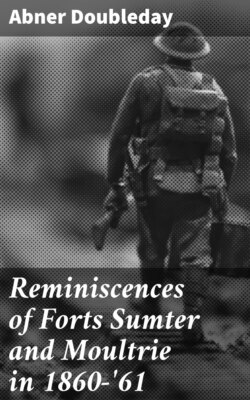Читать книгу Reminiscences of Forts Sumter and Moultrie in 1860-'61 - Abner Doubleday - Страница 3
INTRODUCTION.
ОглавлениеNow that the prejudices and bitter partisan feeling of the past are subsiding, it seems a fitting time to record the facts and incidents connected with the first conflict of the Rebellion. Of the eleven officers who took part in the events herein narrated, but four now survive. Before the hastening years shall have partially obliterated many circumstances from my memory, and while there is still an opportunity for conference and friendly criticism, I desire to make, from letters, memoranda, and documents in my possession, a statement which will embody my own recollections of the turbulent days of 1860 and 1861.
I am aware that later and more absorbing events have caused the earlier struggles of the war to recede in the distance; but those who were in active life at that time will not soon forget the thrill of emotion and sympathy which followed the movements of Anderson's little band, when it became its duty to unfold the flag of the Union against a united South in arms.
I know how difficult it is to write contemporaneous history, or even to give a bare detail of facts, without wounding the susceptibilities of others; but whenever I have felt called upon to give my own opinion, I have endeavored to do so in the spirit of Lincoln's immortal sentiment—"With malice toward none; with charity for all."
FORT MOULTRIE IN 1860.
The Garrison of Fort Moultrie.—Early Indications of Secession.—Situation of the Fort.—Edmund Ruffin and Robert Barnwell Rhett.—The Secretary of War.—Arms sent to the South.—Colonel Gardner.—Captain Foster ordered to Charleston Harbor.—The Officers at Fort Moultrie.—Communications with Northern Men by Cipher.—Proscription of Antislavery Men in Charleston.—Position of Charleston Merchants.—The Secession Leaders only prepared to resist Coercion.—The Mob proves Unmanageable.—General Scott's Letter to the President, October 29th.—The Situation in November.—No Instructions from Washington.—Colonel Gardner's Report to General Wool. Page 13
PREPARATIONS FOR DEFENSE.
Defeat of Captain Seymour's Expedition on the Ashley.—Mayor Macbeth's Explanation.—Captain Foster's Work on Fort Moultrie.—Governor Gist convenes the South Carolina Legislature.—Creation of a Standing Army.—Arrival of Masons from Baltimore.—Situation of Fort Sumter.—A Dramatic Incident.—Secretary Floyd's Action.—Horace Greeley's Advocacy of the Right of Secession.—The Situation November 18th. 30
PRELIMINARY MOVEMENTS OF THE SECESSIONISTS.
Arrival of Major Anderson.—Huger's Opposition to a Premature Assault on Fort Moultrie.—Anderson's Report to the Secretary of War.—Active Preparations by the South Carolinians.—Meeting of Congress.—Attempts at Compromise.—Secession Batteries at Mount Pleasant.—Arrival of Major Buell with Written Orders.—Vain Efforts to Strengthen Castle Pinckney.—Northern Opinion.—Public Meeting in Philadelphia. 41
THE REMOVAL TO FORT SUMTER.
Passage of the Secession Ordinance.—Governor Pickens's Proclamation.—Judge Petigru's Visit to Fort Moultrie.—Floyd's Treachery.—Yancey's Lectures in the North.—The Removal to Sumter. 55
THE FIRST OVERT ACT.
The New Quarters.—Seizure of Castle Pinckney by Charleston Troops.—Raising the Flag at Fort Sumter.—The Sergeant's Daughter.—Major Anderson's Position.—The Charleston Troops take Fort Moultrie.—A Military Problem.—Condition of Fort Sumter.—Governor Pickens's Commission.—A New Outrage. 68
EFFECT OF ANDERSON'S MOVEMENT.
President Buchanan Aroused.—Excitement in Charleston.—The Situation at the Beginning of 1861.—Governor Pickens's War Measures.—"My heart was never in this War". 82
THE "STAR OF THE WEST."
Promise of Succor.—Fatal Delay.—A Contumacious Chaplain.—Visit from our Ladies.—Governor Pickens's Cabinet.—Appearance of the Star of the West.—The Vessel fired upon from Morris Island and Fort Moultrie.—Major Anderson's Protest.—Governor Pickens's Reply. 92
A RESORT TO DIPLOMACY.
Major Anderson's Proposed Diplomatic Negotiations.—Defensive Preparations.—Changes in the Cabinet.—Meade's Defection.—Anecdote of Governor Pickens.—Battery at Cummings Point.—Soldiers' Families Removed.—A Threatening Letter.—Confederate Visitors to the Fort.—Organization of the Confederate Government. 107
THE CRISIS AT HAND.
South Carolina's Grievances.—Inauguration of President Lincoln.—Determination to Re-enforce Sumter.—An Audacious Proposal.—The Shannon.—New Rebel Batteries Unmasked.—Formal Notice of Bombardment. 123
THE BOMBARDMENT.
The First Shot.—Defective Guns.—John Carmody's Exploit.—Destructive Effects of the Bombardment.—Burning of the Officers' Quarters.—Terrific Conflagration. 143
THE EVACUATION.
Senator Wigfall's Volunteer Mission.—Terms of Evacuation Settled.—The Question of Casualties on the Other Side.—Salute to the Flag.—Occupation of the Fort by Southern Troops.—Embarkation.—Welcome in New York.—Conclusion. 161
Appendix 179
MAP OF CHARLESTON HARBOR.
